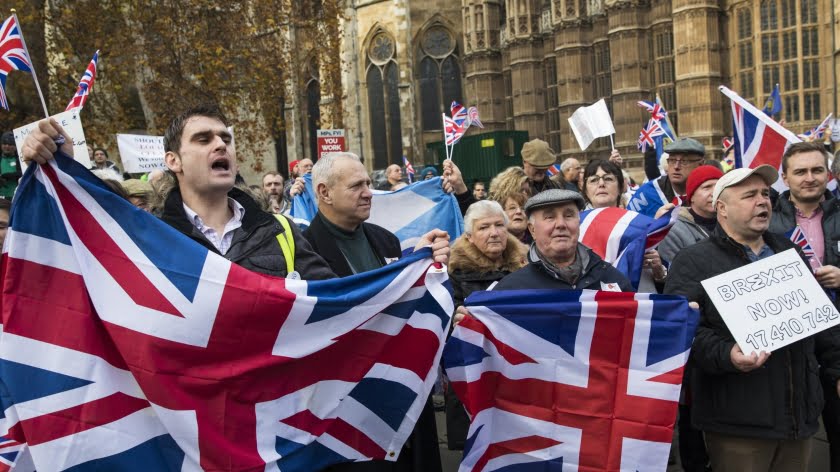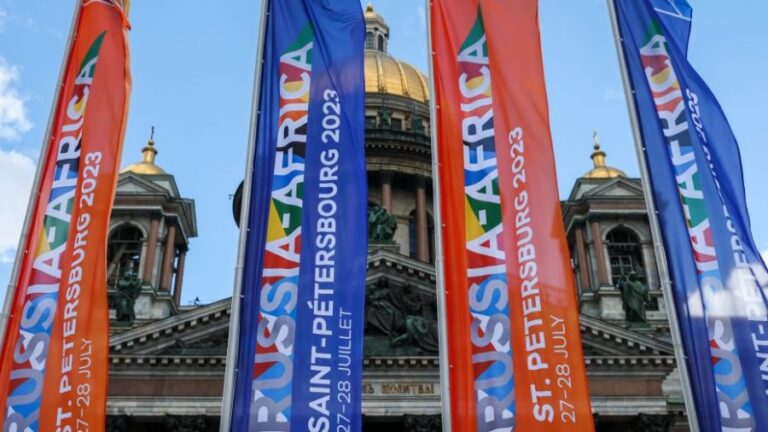Brexit Britain Is on the Brink of a ‘National Breakdown’
I felt frustrated over the past three years at what appeared to me to be the shallow and Westminster-obsessed coverage of the Brexit saga by the media. Here was a crisis like no other in recent British history that was shaking the bedrock of society and government alike, but the reporting and commentary on it were over-focused on party politics and the process of Britain leaving the EU, and not on the reasons it was doing so.
Why were the divisions so deep and the debate, often the polite word for a shouting match, so angry and uncompromising? What did people really believe about Brexit and why did they defend their beliefs with almost religious fervour? Is it true – in the words of the former head of MI6, Sir John Sawyer – that Britain is having “a nervous breakdown” and, if so, why?
Brexit can be compared to an earthquake in which pent up forces are suddenly released, tearing open new fault lines and energising old ones such as inequality, de-industrialisation, globalisation, imperial retreat, immigration and austerity. All these have always had the capacity to provoke crises, but they had not previously done so on anything like the scale that many had forecast. Now they seem to be combining to provide the explosive ingredients in what is shaping up to be the greatest British general crisis since the “Glorious Revolution” of 1688. The date is not chosen at random: in the 17th century the British Isles were a byword for instability and violence and there is no reason this could not happen again.
In some places, the motives for voting Leave – and the reason why voters have not changed their minds – are clear enough: why should any of the ‘left behinds’ and the ‘left outs’ vote for the status quo at the behest of powers that be who had ignored their troubles for decades?
But for now the British, though not the Northern Irish, are over-accustomed by four centuries of relative domestic stability to assume that this is the natural state of things. This contrasts with the experience of every other European country – they have all suffered calamitous defeat in war, foreign occupation or revolution during this long period. The British attitude to the past is therefore more nostalgic than that of its neighbours, fostering a conviction that Britain will always win through whatever the odds, and a feeling that “things will be alright on the night”.
I have spent the past six months travelling around the UK outside London trying to identify the different aspects of this national “nervous breakdown’’, if that is the right description. I chose cities and places in the interests of diversity and because they seemed to be particularly representative of different political, social and economic trends that were part of the Brexit story.
I went to a deprived district in Canterbury, which had once been regenerated by a large EU grant but had still voted Leave; I travelled a little further south to Dover whose great port will be in the frontline of a no-deal Brexit. I visited Cardiff, which, like many metropolitan centres in the EU, has benefited from being plugged into the global economy; this makes it very different from the Welsh Valleys an hour’s drive away which have never recovered from the closure of their mines and steel mills.
Birmingham has bounced back after from the collapse of its automotive industry in the 1970s and 1980s, but one of the architects of its regeneration, Sir Albert Bore, told me that he was fearful that the city’s economy could once again capsize outside the EU, which invested heavily in its renaissance. He says that “my mind almost explodes with rage” when he hears people blame the EU for problems caused by the failures of the UK government. In the northeast of England, the devastating shock of de-industrialisation, exacerbated by austerity, largely explains the region’s negative vote in the referendum.
Northern Ireland is a case apart but is the region in the UK where the decision to leave the EU is already having the greatest destabilising impact. I was struck by the fecklessness with which British politicians were unpicking the Good Friday Agreement that ended 30 years of guerrilla war, the most intense to be fought in Europe since the Second World War. The commentator and historian Brian Feeney explained to me that “all this stuff about bar codes and cameras [monitoring the border] is nonsense. They would not last a weekend because people would pull down any cameras or similar arrangements.”
People on mainland Britain are ignorant of Northern Ireland, but the whole country has become more segmented and ill-informed about what other regions are thinking. Chris Day, the vice chancellor of Newcastle University, says he was surprised when the UK voted to leave the EU: “It is the company you keep – university and London people didn’t understand what Sunderland and Wales were thinking.”
In some places, the motives for voting Leave – and the reason why the voters have not changed their minds – are clear enough: why should any of the “left behinds” and the “left outs” vote for the status quo at the behest of powers that be who had ignored their troubles for decades? More mysterious is why well-off farmers in bucolic Herefordshire should have voted to leave the EU, which has always paid them big subsidies simply because they own land. A feature of EU referendum often commented on is that so many people voted against their own economic interests, none more so than sheep farmers in the Welsh hills, who face extinction without the EU but voted Leave because, according to local sources, they feared immigration – though immigrants are almost entirely absent from the Welsh hills.
Some advantages spring from looking at Brexit Britain after working in the chronically unstable and divided countries of the Middle East where I have spent most of my journalistic career since the 1970s, with stints in Belfast, Moscow and Washington. The experience makes certain elements in the Brexit crisis jump out at one as having similarities with what I had witnessed elsewhere, while other developments are unique to Britain. Leavers tend to be, consciously or unconsciously, believers in British “exceptionalism’’ who bridle at the mention of parallels between Britain and other nations. Remainers pride themselves on being more globally minded than their parochial opponents, but their preconceptions often turn out to be equally insular.
In one respect, the ideology – if that is not too grand a word – propelling Britain out of the EU is easy to understand: the Brexiters are a nationalist movement like many others, from Baghdad to Caraccas and Melbourne to Quebec, that have shaped the modern world. A desire for self-determination, for national freedom, is a universal political instinct that is usually accompanied by promises of economic benefits though these seldom materialise.
Ireland was certainly worse off for half a century because it separated from Britain in 1922, but few Irish would have considered this a persuasive argument to give up on independence. Nationalist and revolutionary movements almost invariably blame a foreign power or a homegrown tyrant for the ills of their society, often with good reason. But shifting the blame usually hides a strong dose of politically convenient scapegoating.
In Iraq, for instance, opponents of Saddam Hussein accused him of fomenting religious divisions between Sunni and Shia Iraqis. The impression was given that once he was gone such animosities would end while, in the event, his fall opened the way for a sectarian civil war of extraordinary savagery. Closer to home, colonies of Britain and France in the 19th and 20th centuries denounced London and Paris for being the source of their problems, just as the Brexit Party and the Conservatives accuse Brussels today, though with far less justification.
This imbalance of forces should be self-evident, yet, everywhere I went in Britain from Dover to the Welsh Valleys, Leavers would discount these facts of economic and political life
Talking to Leavers around the country, I felt that the riskiest part of their version of English nationalism was that it was suffused with wishful thinking about English superiority in all things. Such assumptions were never true even in the glory days of the British empire. But such fantasies stop Leavers having a realistic view of the political and economic balance of power in the real world, particularly in the most deprived regions of Britain that voted solidly for Leave: “People say ‘we did it before and we will do it again’,’’ says David Hardman, a former Labour councillor in Newcastle. “But we are not competitive in terms of skills and education. The northeast’s economy will be massively hit. We simply do not have a competitive edge.”
Mistaken assumptions of national superiority have been at the root of some of the greatest miscalculations in recent European history, luring France into a disastrous war in 1870 and leading Germany to do the same thing in 1914 and 1939. Could the same thing now be happening to Britain?
Over the past three years, the Brexiter leaders have been perplexed and angered by British negotiators’ inability to get their way in talks in Brussels, blaming lack of will power, commitment to Brexit, and even treachery for their failure. They ignored the obvious fact that in any negotiations or confrontation with the 27 EU states combined, they, as the more powerful player, will hold the whip hand. Boris Johnson reportedly plans as soon, as he is installed as prime minister, to seek a trade deal with the US to compensate for reduced access to the EU, but 45 per cent of British exports went to the EU in 2017 and 53 per cent of its imports came from there. The comparable figures for the US are 18 per cent and 11 per cent. Proximity matters: exports to Ireland are four times higher than those to Australia.
This imbalance of forces should be self-evident, yet, everywhere I went in Britain from Dover to the Welsh Valleys, Leavers would discount these facts of economic and political life. In south Wales, I was told that such concerns were all part of “Project Fear” and assured that the French would always want to sell their cheese to Britain and the Germans their cars. A student at Birmingham University, Michael Douglas, said he had voted Leave because he “felt that the EU was a bit undemocratic” and they “need us as much as we need them”. A well-educated and intelligent Leave campaigner in Newcastle, who did not want his name published, said that Europe was stagnating and Britain needed to look to wider, more global horizons in choosing trading partners such as China, India and Brazil.
People were motivated by the idea that Britain should become a great nation again in some Churchillian version of Trump’s America. There are those who think that way but they are not the dominant component in the Leave coalition
Remainers tend to curl their lips at what they see as culpable and wilful ignorance of economics on the part of their opponents. But here they make a damaging mistake and fail to see that in socially unequal Britain, where prosperity is skewed towards London and the southeast, that potential damage to the economy as a whole is not necessarily a compelling argument for much of the population.
It might be convincing in the metropolitan core of cities such as Birmingham, Cardiff and Newcastle, but not in marginalised places like Dover, Hartlepool and the Welsh Valleys. Eddy Moreton, a musician, pub owner and convinced Remainer, speaks sympathetically about the people in Walsall, where he originally comes from, who voted for Brexit. He says Walsall “has had no investment for 40 years since Thatcher destroyed the manufacturing industry. We are now a finance-based economy [in Britain], but there is nothing in it for them and that is what they are revolting against. They don’t care if the GDP goes down because, as the man said, it is not their GDP.”
Alex Snowden, a left-wing Leave supporter in Newcastle, made much the same point about the northeast: many people he spoke to at the time of the referendum were not passionate about it, but they would ask: “What do we have to lose? Things are already desperate, so let’s see what happens, let’s give it a go.” This mantra is the same throughout de-industrialised England and Wales: whatever the EU has done it has not done nearly enough to turn their lives around and they also note that the period of decline seems to fit rather neatly with Britain’s accession to the EU in 1973.
Snowden makes another point worth considering because its impact is yet to come. He says that people’s sense of identity and their image of themselves and their country has become much more wrapped up in Brexit since 2016, with the result that positions, for or against leaving the EU, are harder and more uncompromising than they were three years ago.
This picture of Brexit as the outward and visible sign of a deeply divided Britain is confirmed by polling data. It shows that those in wards where educational qualifications are lowest and the average age the highest are precisely those that voted Leave. Out of 1,283 individual wards studied by Martin Rosenbaum, an expert in this field, the biggest Leave vote was the 82.5 per cent cast against the EU in the Brambles and Thornton ward in Middlesbrough, which also has less people with a degree, only 4 per cent of the population, than any other ward in England and Wales.
Why do such people in deprived areas single out the EU as the source of their troubles? It is not as if there were not plenty of other candidates who might be blamed. I asked an independent councillor in Caerphilly in south Wales, Graham Simmonds, why this was so, and was it not unfair to scapegoat Brussels when the British government and, to a far lesser degree, the Welsh assembly, deserved most of the blame?
Simmonds agreed this might well be so but “it was the EU against which the people decided to push back”. Again and again, wherever I went in the poorer areas of the country, those I spoke to complained that their views had been invariably disregarded in the past and the referendum was the first chance for them to have their say. Eric Segal, a trade unionist from Folkestone, said he had seen people vote who had never voted before which is why he thought “there would be blood in the streets” if their vote was disregarded or there was a second referendum.
The UK has become less influential in Europe because it is leaving the EU, while nationalists in Northern Ireland and Scotland see separatism as an increasingly feasible option. The French see the revolutionary nature of what Britain is proposing to do more realistically than the British themselves
No generalisation about Brexit is ever entirely correct. The EU may have failed to do enough to help the victims of de-industrialisation and austerity in most of England and Wales, but there were specific areas where it did a great deal. It turned out that I lived near one of them in Canterbury: a poor urban district called Thanington with a population of 2,794 on the outskirts of the city.
Twenty years ago, Thanington was nicknamed “Little Beirut” because it was notorious for violence and many of its houses were empty. A local children’s play group had to keep their toys in a gravediggers’ hut next to the cemetery. What turned the district round was an EU grant of £2.5m to refurbish the houses and build a community centre with the result that crime fell and children had a safe place to study and play. Even so, a majority of residents are reported to have voted Leave in what many Remainers might see as one more example of a self-destructive act of ingratitude.
Nick Eden-Green, a Liberal Democratic councillor for the area, says there were two main reasons for the outcome of the referendum: voters were saying “a plague on all your houses” to the political parties, and that they felt threatened by immigration. “If you knock on doors people say ‘it is all these bloody illegals’, [who are clogging up the NHS and living on benefits],” he says.
Immigration has a curious position in the Brexit crisis. Everybody agrees that it was one of the two overriding issues that gave the Leave campaign its narrow victory three years ago. Since then Brexit leaders, Boris Johnson and Michael Gove, along with the pro-Brexit media, have downplayed the immigrant threat which they once promoted.
Liberals draw solace from polls showing that the public feels less strongly about immigration than it did three years ago. But I doubt if the issue has gone away or, if it has temporarily disappeared, that it has not gone very far. Dover is a good example: it has a reputation for racial tension because of the Slovakian Roma or gypsy community that migrated there in the 1990s, and locals are very conscious of the trickle of mostly Iranian asylum seekers who make their dangerous way across the Channel in fragile rubber boats.
Sam Hall, a local teacher, says residents complain to her, saying: “If we can’t look after our own, why should we extend a hand to others?” A trade union leader in Dover, who wanted to stay anonymous, told me: “The Leave vote was sold on one subject and one subject only which was immigration.” He dismissed the notion that people were motivated by the idea that Britain should become a great nation again in some Churchillian version of Trump’s America. There are those who think that way but they are not the dominant component in the Leave coalition.
Remainers and many economists say immigration does nothing but economic good, replenishing an ageing indigenous labour force. They downplay the belief that immigrants keep down wages and take jobs that might otherwise go to local people. But for those who are just getting by, immigrants pose one extra pressure, real or imaginary, on top of many others.
The latter is an important point: we know the world around us not only, or even primarily, from personal experience but from what others tell us or what we see on television or read in a newspaper. An Ipsos Mori poll six years ago, in the lead up to the rise of Ukip and the promise of a referendum, gives a fascinating picture of public perception of what is happening compared to the reality. On immigration, the poll showed that people believed 31 per cent of the population were immigrants while the true figure was 13 per cent; the black and Asian population was estimated by members of the public to be 30 per cent while the correct figure is 11 per cent. A quarter of people believed that foreign aid is a top item in government expenditure while in fact it is only 1.1 per cent of the total.
People have frequently asked me over the last six months what I think the outcome of the Brexit crisis will be. I always reply that I do not know and that is early days, which is true. But that is true only of the economic consequences of Brexit, which are still in the future because Britain remains in the EU. But the same is not true of political change, which is already with us, with the Conservative and Labour parties both split and under siege on different flanks by the Brexit Party.
Polarisation is deep and getting deeper but even if Brexit occurs that is not going to be the end of the story. A former Ukip member, who campaigned all round the country, said that if the Brexit Party ever got into power it would immediately split because its activists tend to be ultra-Thatcherites seeking to create a free market neoliberal Britain closer to the US model than the EU. But the mass of Leave voters he had encountered in the northeast and in the coastal towns of Essex and Kent – and he believed the same was true of the Brexit Party support – wanted more not less state intervention.
A further political change that is already with us is the weakening of the British state. It has become less influential in Europe because it is leaving the EU, while nationalists in Northern Ireland and Scotland see separatism as an increasingly feasible option. The French see the revolutionary nature of what Britain is proposing to do more realistically than the British themselves.
French journalist Adrien Jaulmes, writing in Le Figaro, neatly encapsulates the shifts that have already happened saying that “the UK has built its power on two principles: keep the British Isles united and the European continent divided. Today it is close to succeeding in doing the opposite.”
There is something absurd about the candidates to be the next prime minister, Boris Johnson and Jeremy Hunt, saying they will unite the country when they are widening its many fault lines. Remainers continue to make the mistake of presenting themselves as the party of the status quo. Economic disaster may or may not be around the corner, but Brexit has already produced irreversible political reformation and disintegration which will not go away whether or not Britain is inside or outside the EU.
By Patrick Cockburn
Source: The Independent







